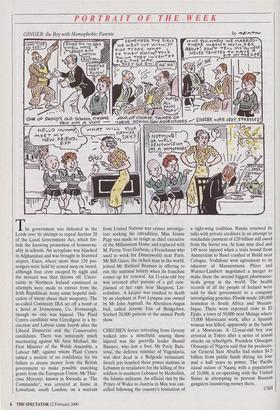PORTRAIT OF THE WEEK
The government was defeated in the Lords over its attempt to repeal Section 28 of the Local Government Act, which for- bids the knowing promotion of homosexu- ality in schools. An aeroplane was hijacked in Afghanistan and was brought to Stansted airport, Essex, where more than 150 pas- sengers were held by armed men on board, although four crew escaped by night and the steward was then thrown off. Uncer- tainty in Northern Ireland continued as attempts were made to extract from the Irish Republican Army some hopeful indi- cation of intent about their weaponry. The so-called Continuity IRA set off a bomb at a hotel at Irvinestown, Co. Fermanagh, though no one was injured. The Plaid Cymru candidate won Ceredigion in a by- election and Labour came fourth after the Liberal Democrat and the Conservative candidates. There was separately much murmuring against Mr Alun Michael, the First Minister of the Welsh Assembly, a Labour MP, against whom Plaid Cymru tabled a motion of no confidence for his failure to secure money from the British government to make possible matching grants from the European Union. Mr Thar- cisse Muvunyi, known in Rwanda as 'The Commander', was arrested at home in Lewisham, south London, on a warrant from United Nations war crimes investiga- tors seeking his extradition. Miss Jennie Page was made to resign as chief executive of the Millennium Dome and replaced with M. Pierre-Yves Gerbeau, a Frenchman who used to work for Disneyworld near Paris. Mr Bill Gates, the richest man in the world, joined Mr Richard Branson in offering to run the national lottery when its franchise comes up for renewal. An 11-year-old boy was arrested after parents of a girl com- plained of her rape near Skegness, Lin- colnshire. A keeper was crushed to death by an elephant at Port Lympne zoo owned by Mr John Aspinall. An Aberdeen-Angus bull, called Jeremy Eric of Bridgefoot, fetched 28,000 guineas at the annual Perth show.
CHECHEN forces retreating from Grozny walked into a minefield; among those injured was the guerrilla leader Shamil Basayev, who lost a foot. Mr Pavle Bula- tovic, the defence minister of Yugoslavia, was shot dead in a Belgrade restaurant. Israeli jets bombed three power stations in Lebanon in retaliation for the killing of five soldiers in southern Lebanon by Hezbollah, the Islamic militants. An official visit by the Prince of Wales to Austria in May was can- celled following the country's formation of a right-wing coalition. Russia renewed its talks with private creditors in an attempt to reschedule payment of £20 billion still owed from the Soviet era. At least nine died and 149 were injured when a train bound from Amsterdam to Basel crashed at Briihl near Cologne. Vodafone won agreement to its takeover of Mannesmann. Pfizer and Warner-Lambert negotiated a merger to make them the second biggest pharmaceu- ticals group in the world. The health records of all the people of Iceland were sold by their government to a company investigating genetics. Floods made 100,000 homeless in South Africa and Mozam- bique. There were repeated riots in El Ejido, a town of 50,000 near Malaga where 15,000 Moroccans work, after a Spanish woman was killed, apparently at the hands of a Moroccan. A 12-year-old boy was arrested in Tokyo after a series of sexual attacks on schoolgirls. President Olusegun Obasanjo of Nigeria said that his predeces- sor General Sani Abacha had stolen $4.3 billion from public funds during his four and a half years in power. The Pacific island nation of Nauru, with a population of 10,000, is co-operating with the United States in attempting to prevent Russian gangsters laundering money there. CSH


































































 Previous page
Previous page